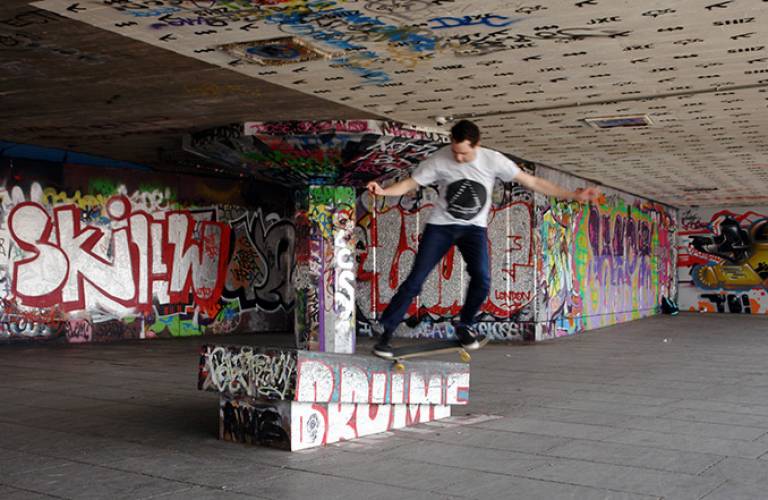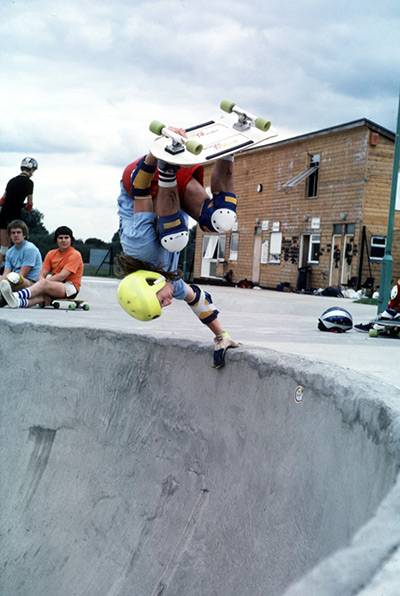Changing perceptions of skateboarding

12 December 2014
Professor Iain Borden has played a central role in challenging the popular understanding of skateboarding. He looks at how skateboarding creates a new understanding of urban space, showing how cities and architecture are not just built by architects and urban planners, but remade constantly through everyday usage.
Skateboarding is perceived with bemusement and bewilderment by many amongst the general public and the media. It is sometimes regarded as a childish activity, yet is a favourite sport of millions around the world and in the UK.
Through Borden's work, he has contributed to a paradigm shift in how the public, media, design professionals and urban planners - as well as skateboarders themselves - understand and inhabit these spaces.
Professor Borden (UCL Bartlett School of Architecture) used his research to answer an important question faced by many urban planners: how to provide spaces for urban sports without diminishing their counter-cultural nature? In 2002, he advised Milton Keynes on how to develop what was later called a 'skateplaza' - skateboarding sites which are more like ordinary streets and less like custom-made facilities. When the £100,000 Buszy facility opened in 2005 - designed by Richard Ferrington, Rob Selby and local skaters - it was called by professional skateboarders 'the best spot they have ever skated' and sparked a new trend for skateplaza design that skateboarders actually enjoyed using. Over 100 similar facilities have been established, ranging from the small Fisher Lane Park in Mansfield to the 3,200 square metre Central Forest Park in Stoke which cost half a million pounds.
Professor Borden is one of the main sources for media and artists investigating skateboarding. He has been interviewed in newspapers and on television around the world, and provided the ideas underlying important films such as the avant-garde Hacking the Streets (2009-10) and exhibitions such as Rise of Rad at the Torrance Museum in California (2010).

This media work has contributed to a better public understanding of skateboarding. When the Undercroft at the Southbank Centre in London, which is considered the sport's original home in the UK, was under threat, Professor Borden contributed to documentaries and news coverage arguing that this site was as important to London life as a village green, and participated in the movement which led to over 50,000 members joining the 'Long Live the Southbank' campaign. In 2013 he also worked with the Southbank Centre, who agreed to allocate £1 million and an alternative permanent site under the Hungerford Bridge designed for skateboarding, BMX, graffiti and other urban sports. Whilst stating publically that this was a compromise solution, Professor Borden drew on his earlier experience to develop the design brief for the space and so offer skateboarders a worthy successor to the well-loved Undercroft. In the end, following support from the Mayor of London, the campaign to save the Undercroft was in any case successful, with the Southbank Centre entering into a planning agreement to guarantee the future of skateboarding at its historic home.
In 2014, Professor Borden's work has also directly led to the listing by English Heritage of the "Rom" skatepark in London - the first skatepark in Europe to be given historic preservation status. This has been widely reported on the BBC, ITV and news media globally.
Skateboarding offers a tremendous opportunity for everyone involved to be independent-minded, creative and resourceful. So I am absolutely delighted that, through UCL, I can both research on skateboarding and play a part in its on-going development here in the UK and abroad. Understanding what skateboarding is all about is not easy, as it is composed of some many different strands and attitudes, but researching the subject over many years has lead to all kinds of changes in what people think and do, from skaters own views to skatepark design, artistic activity and heritage policy. I am particularly delighted that institutions and policy makers of all kinds are now beginning to fully recognise the value of skateboarding, as can be seen by the saving of the Undercroft at the Southbank Centre in London, and by the preservation of the "Rom" skatepark in Essex. - Iain Borden
 Close
Close

